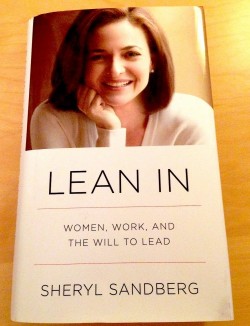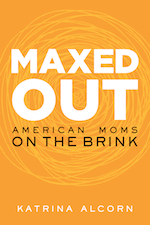Cross-posted on The Huffington Post
Imagine a job where you could work when and how you please. Where you could decide, on a daily basis, whether to show up at meetings or show up at the office at all? A job with unlimited sick time and vacation time? Where you could leave work at 3 p.m. to pick up your kids and none of your coworkers would give you the stink eye.
I know. It sounds too good to be true. But that job exists, according to Cali Ressler, one of the co-founders of the management strategy called Result-Only Work Environment (ROWE). I discovered her excellent book Why Work Sucks and the sequel, Why Managing Sucks, a few months ago when I was doing research for my own book.
Cali and her business partner, Jody Thompson, believe employees should be evaluated on how effective they are, rather than on traditional measures like the amount of time spent in the office. And they are teaching businesses like Gap Inc. to put this idea into practice.

Recently I interviewed Cali by phone to find out how ROWE could benefit exhausted, overworked parents like us. Here’s what she said:
Question: In Why Work Sucks you say “we have time all wrong.” Explain what you mean by this.
Answer: Back in the industrial age, we didn’t have the technology we have today. You had to be in a factory and punch in a clock. Now we have voicemail, email, cell phones — all this new technology — but we’re still operating under the time constructs of the industrial age.
People are available 24/7. If you don’t take control of this technology, it will completely overtake your life. In a ROWE, people are living 24/7. Time is Monday through Sunday. Every day, you get to make the decision about what is the most productive thing to do for your life.
Q: It’s great to get to choose when you’re in an office, but for people like me who do creative work, spontaneous interactions with coworkers can be really valuable. How do you make room for that in a ROWE?
A: We call those spontaneous interactions “drive bys.” What we often hear is yes, there can be comfort in knowing someone is right there, but the other side — what it feels like to be driven upon — it feels like an interruption. It doesn’t make us productive. The key is to set clear goals and measures.
Q: How do you set clear goals with creative work, when the outcome can be somewhat subjective?
A: Even creative teams can and need to set clear goals and measures. Chances are if you don’t have them, you’re wasting a lot of people’s time. It’s a cop out to say we can’t have clear goals.
In your case, if you’re working in a consulting agency, you have to get very, very clear with the client. Too often we get wrapped up in politics of creative agencies when the focus should be on what the client is expecting.
By the way, in a ROWE we don’t say you’re never in the office. We think the office should be a tool that people use when they need to.
Q: I hear what you’re saying. In my work, I’ve lived the nightmare of not having clear goals (and then working until 2 a.m. to meet a deadline). But it’s really tough working with people who don’t have kids, who don’t mind working until 2 a.m. How do you change culture?
A: It’s true that having kids can give you a sense of urgency and efficiency at work. What we do with ROWE is we say you have to start with a “vertical slice,” meaning you need everyone at all levels of the reporting structure, from company leaders and managers on down to participate. That way, you’re rewiring a subculture.
Everyone needs to u
nderstand that efficiency will be rewarded. It’s not about time, it’s about results. In a ROWE, you are completely focused on outcomes, so there’s no point in staying until 2 a.m. just to show you’re busy.
Q: In a ROWE, all meetings are optional. But for some of us, a lot of our work actually gets done in meetings. What if I need people in a meeting, and they don’t show up?
A: Yes, that’s a common fear.
Most often, when people get a meeting invite, they blindly hit ‘accept.’ But when we ask people how much of their time is spent in unproductive meetings, people usually say it’s between 30-80 percent. We want people to start making those meetings add to their outcomes. If they’re clear about the goals and expectations, they will be in the right meetings, and the meetings will be more productive.
Q: One of the themes in my book is the resentment that builds up at work between people who have kids and those who don’t. Is that something you’ve observed in your work?
A: Absolutely. Yes. We do a whole session on “sludge” with teams. Sludge is judgment about how others spend their time. For example, “Long lunch again?”, “Must be nice to show up at 10 a.m. Wish I had your job!”, “Sick kid again? Wish I had a kid.”
In these sessions, you can feel the jealousy of the non-parents. People who don’t have kids sometimes think parents have a built-in excuse. They think the parents are getting something that they’re not getting. They think, ‘well I’d love to do things outside of work with my friends, but that’s not a socially acceptable excuse to go home early.’
Q: What can ROWE do to address this?
A: It all goes back to autonomy. In a ROWE, you get to make your own decisions about everything you do. It’s suddenly acceptable to go to that book reading at 3 p.m. on a Wednesday as long as you’re still getting results. I think it becomes liberating when people see that they can do what they want to do and not have to worry about thinking of a socially acceptable excuse for it.
Q: I like the idea that you don’t have to have kids to have a life. That said, having kids puts a non-negotiable constraint on our time. The research shows more than half of working moms would prefer to work part-time if they could. How does ROWE deal with the need for some of us to work part-time?
A: Often we meet people who negotiated a part-time schedule because that was the only way they could carve out the time they needed for their lives. But then they tell us, “I basically do the same work I did before, but now I have a pay cut.” So in a ROWE, they go back to full-time pay, knowing that they can work things out in their lives.
We need to stop talking about full-time versus part-time and instead, talk about outcomes. If we need to, we can cut back on outcomes, and take a commensurate pay cut.
Q: OK, I know we’re not supposed to talk about time, but I’m going to ask this anyway. Do you think one can work 30 hours a week and be an effective leader in a company? Can you be an effective leader and unplug once in a while?
A: Yes. You can. And I would argue you need to unplug sometimes–whether it’s for an afternoon or a vacation to Mexico.
I did an experiment a couple years ago. People kept asking me how many hours I worked and I really had no idea. So I tried to count my hours. This was after my last child was born (I have four kids). I was literally changing my daughter’s diaper when I suddenly realized the solution to a problem one of my clients was having. I thought, “Can I count this as work time? How do I count this?”
You can’t count. Your brain is your brain. It’s working no matter what. So I say, yes, you can be a leader in 30 hours a week. The key is to move in and out of your life and your work the way you need to.
Q: I get emails practically every week from stressed out parents who are going nuts with all the demands on their time. Do you have any advice for them?
A: I have two pieces of advice.
Number 1: Make sure you’re really clear about your goals and expectations at work. If your goals aren’t clear, that’s a good place to start. Those goals become an anchor, a source of confidence. You can look in the mirror and say, “I know I’m tracking toward success.”
Number 2 is about sludge. Sludge, as I mentioned earlier, is all the ways people make judgments about you. The next time someone questions how you’re spending your time, don’t come back with an excuse. Instead, say, “Is there something you need?” or “Is there anything I can do for you?”
Those phrases have a way of shutting down other people’s judgments. This is especially important for moms and dads who feel they have to justify how they spend their time. Justifying your time zaps your energy. By answering this way, you show that you are focused on results.
* * *Interested in ROWE? Check out
Why Work Sucks and
Why Managing Sucks. Or
contact ROWE to get a free culture assessment for your workplace.
* * *
Psst! Guess what? Goodreads is doing a free June giveaway of an advanced copy of Maxed Out: American Moms on the Brink. Enter to win here.










